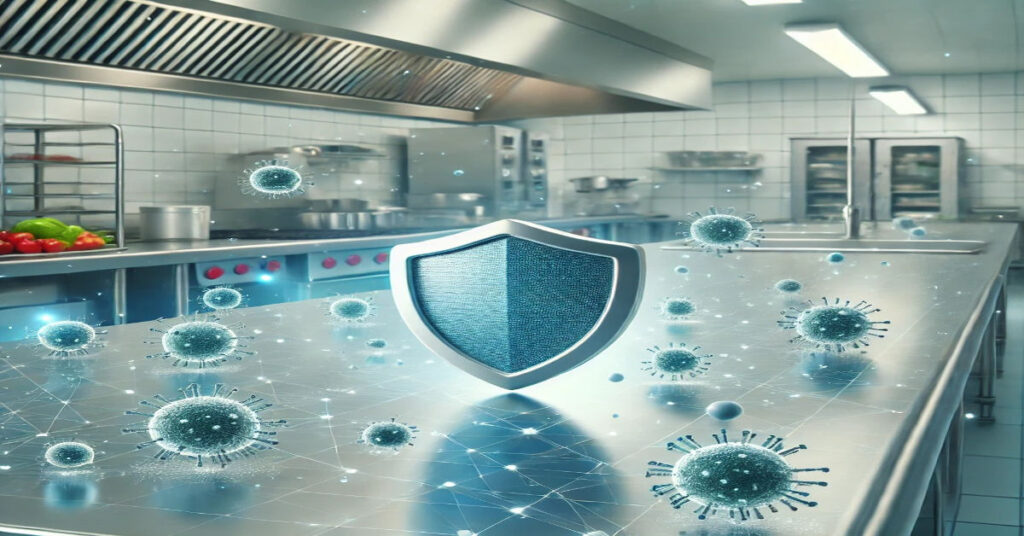In a world where cleanliness and hygiene have taken center stage the importance of protecting surfaces from harmful microorganisms cannot be overstated. Whether it’s a hospital, a restaurant, or your own home, invisible threats like mold, bacteria, and algae can pose serious health risks if left unchecked. Enter foodservice and healthcare coatings—innovative solutions designed to create safer, cleaner environments. These coatings act as an invisible shield, safeguarding spaces where hygiene is non-negotiable. Let’s explore how these coatings are revolutionizing safety in foodservice and healthcare settings.
What Are Foodservice and Healthcare Coatings?
Foodservice and healthcare coatings are specialized surface treatments that provide a protective barrier against harmful microorganisms. These coatings are designed to inhibit the growth of bacteria, mold, and algae, ensuring that surfaces remain hygienic and safe. Ideal for high-risk environments like hospitals, kitchens, and food processing facilities, these coatings are a game-changer in maintaining cleanliness and preventing contamination.
Why Are These Coatings Essential?
The COVID-19 pandemic has underscored the importance of hygiene in all aspects of life. Harmful microbes, though invisible, can thrive on surfaces and spread rapidly, leading to outbreaks and health hazards. Here’s why foodservice and healthcare coatings are indispensable:
- Prevent Contamination: Stop the spread of bacteria and viruses in high-traffic areas.
- Enhance Safety: Protect vulnerable populations, such as patients and customers.
- Long-Lasting Protection: Provide durable solutions that reduce the need for frequent cleaning.
- Peace of Mind: Ensure a cleaner, safer environment for everyone.
How Do Foodservice and Healthcare Coatings Work?
These coatings utilize advanced technology to create surfaces that are inhospitable to harmful microorganisms. Here’s a breakdown of how they function:
- Antimicrobial Properties: Embedded agents actively inhibit the growth of bacteria and mold.
- Self-Cleaning Surfaces: Some coatings are designed to repel dirt and grime, making cleaning easier.
- Durability: Resistant to wear and tear, ensuring long-term protection.
- Eco-Friendly Options: Many coatings are formulated to be safe for the environment.
Applications in the Foodservice Industry
The foodservice industry is one of the primary beneficiaries of these coatings. From restaurants to food processing plants, maintaining hygiene is critical to preventing foodborne illnesses. Here’s how these coatings are making a difference:
Kitchen Surfaces
Countertops, cutting boards, and food prep areas are hotspots for bacteria. Coatings create a protective layer that reduces the risk of contamination.
Food Storage Containers
Coatings can be applied to containers to prevent the growth of mold and bacteria, ensuring food stays fresh and safe.
Dining Areas
Tables, chairs, and other high-touch surfaces in dining areas can be treated to minimize the spread of germs.
Applications in the Healthcare Sector
In healthcare settings, the stakes are even higher. Hospitals and clinics must maintain sterile environments to protect patients and staff. Foodservice and healthcare coatings play a vital role in achieving this goal:
Hospital Equipment
From bed rails to surgical tools, coatings can be applied to equipment to reduce the risk of infections.
Patient Rooms
Surfaces in patient rooms, such as walls and furniture, can be treated to create a safer environment for recovery.
Laboratories
Coatings help maintain sterile conditions in labs, where contamination can compromise research and testing.
Benefits of Using Foodservice and Healthcare Coatings
The advantages of these coatings extend beyond just hygiene. Here’s why they’re becoming a must-have in various industries:
- Improved Hygiene: Significantly reduce the presence of harmful microorganisms.
- Cost-Effective: Lower maintenance and cleaning costs over time.
- Versatility: Suitable for a wide range of surfaces and materials.
- Compliance: Help businesses meet stringent health and safety regulations.
Choosing the Right Coating for Your Needs
With a variety of options available, selecting the right coating can seem daunting. Here are some factors to consider:
- Type of Surface: Different coatings are designed for specific materials like metal, plastic, or wood.
- Environment: Consider the level of foot traffic and exposure to moisture or chemicals.
- Application Method: Some coatings are spray-on, while others require professional application.
- Certifications: Look for coatings that meet industry standards and regulations.
The Future of Foodservice and Healthcare Coatings
As technology advances, so do the capabilities of these coatings. Innovations in nanotechnology and eco-friendly materials are paving the way for even more effective solutions. The future promises coatings that are not only more durable but also smarter, with self-healing properties and enhanced antimicrobial effects.
Conclusion
Foodservice and healthcare coatings are more than just a trend—they’re a necessity in today’s world. By providing an invisible shield against harmful microorganisms, these coatings play a crucial role in maintaining hygiene and safety in high-risk environments. Whether you’re running a restaurant, managing a hospital, or simply want a cleaner home, these coatings offer a reliable and effective solution. Embrace the power of innovation and protect what matters most with foodservice and healthcare coatings.
FAQs
1. What are foodservice and healthcare coatings?
They are specialized surface treatments that protect against harmful microorganisms like bacteria and mold.
2. Where can these coatings be used?
They are ideal for kitchens, hospitals, labs, and any environment where hygiene is critical.
3. How long do these coatings last?
Most coatings offer long-lasting protection, reducing the need for frequent reapplication.
4. Are these coatings safe for food contact?
Yes, many coatings are specifically designed to be safe for surfaces that come into contact with food.
5. Can I apply these coatings myself?
Some coatings are DIY-friendly, while others may require professional application for best results.
6. Are there eco-friendly options available?
Absolutely! Many coatings are formulated to be environmentally safe and sustainable.







